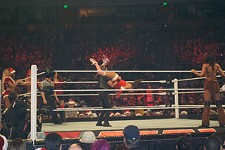'Ghosts of Ole Miss' Comes Off as Obtuse
Attempt at explaining a civil rights story is a mess
By Will Eidam, 7:00PM, Tue. Oct. 30, 2012
Remember the scene in A League of Their Own when an African-American woman throws a foul ball back to Dottie Henson and the audience is given the heavy-handed message that, Hey, black people are just like us! Well, that was a better lesson on civil rights than anything from Ghosts of Ole Miss, an unimpressive film in ESPN's 30 for 30 series.
It might be unfair timing to narrator Wright Thompson and Director Fritz Mitchell that they chose to do a documentary in 2012 based on civil rights and its relation to sports. We’ve already seen so many movies that take the civil rights + sports = cinematic gold formula (Remember the Titans, Glory Road, Brian’s Song, The Express, etc.) that it seems like there’s nothing new to explore 50 years later. The only way to discover something new is to view it from a fresh perspective.
Case in point, 2011’s The Help. While the fictional film was criticized for painting a broad stroke over racial controversy, many in the African-American community (sports writer Jason Whitlock, in particular) praised the film for depicting accurate portrayals of what it was like as a black maid in the '60s, something we hadn’t really seen before. (Aside from a scene or two in Mad Men, I suppose. Oh, Carla, how we miss you.)
The only way I could have truly appreciated an actual portrayal of what the 1962 Ole Miss football team did for Oxford would have been if I had a few powerful testimonials from the African-American community. Instead, all I was given were a few sound bites from James Meredith (that surprisingly didn’t carry a lot of weight) and a lot of heavy-handed pats on the back from white people who wanted to forget about the riot, but were so proud of their football accomplishments that year.
And what an accomplishment it was! After all, their ranking was affected by that silly little riot which one former player said gave Ole Miss “negative publicity.” (That, or voters thought an undefeated USC Trojans team with victories over three Top 10 teams was pretty good too.) Poor Ole Miss. They suffered so much but overcame it all. They must be so proud about that Sugar Bowl victory. That’s what everything was about, after all.
But to play devil's advocate to my pessimistic view of this doc, let's look at all that the football team accomplished for the university in 1962. By going undefeated, they brought a community together as blacks were able to stand alongside whites in the bleachers while they both cheered on the Rebels and their undefeated season. Oh wait, that didn’t happen. Not even Meredith was able to attend a game that year.
Ole Miss did manage, however, to change their mascot from Colonel Reb, a caricature of a plantation owner, to a proud black bear that year, ultimately admitting that the school’s ties to Confederate days past were no longer acceptable. But wait, that didn’t happen until 40 years later. Rest assured, though, that it happened thanks to that miracle season from the all-white football team! At least, that’s what Thompson wants you to believe.
The saving grace of the film was that memorable moment when coach Herman Boone took his team of integrated football players on a morning run to Gettysburg to teach them a lesson about the purpose of the Civil War and that, “If we don’t come together … we too will be destroyed.” Oh wait, that was in Remember the Titans. I guess sometimes a fictional story based on truth is more powerful than a true story based on a fictional narrative.
If the 1962 Ole Miss football team did anything to help integration and civil rights, I did not see that in this film. These were merely two historical events that happened at the same time. I guess you could say that the two events were separate, but certainly not equal.
I feel like I should stop writing because I, like Wright Thompson (born in 1976), don’t have much of a grasp on what happened back in 1962. I don’t feel I can write eloquently or intelligently enough to truly comprehend what happened. As Thompson says, “It’s hard for Mississippians to explain something we don’t fully understand ourselves.”
Next time, I’d suggest understanding something as important as the civil rights movement before telling a story about it and its relation to sports. Thanks in advance.
Extra Point:
-The MVP of this film has to go to the recordings of the Kennedys speaking to Gov. Ross Barnett. Barnett was so comically sleazy in this film that I was waiting for the scene where he accepts a bribe disguised as a homemade pie. In other words, I’m surprised he didn’t put James Meredith in the "hole.”
A note to readers: Bold and uncensored, The Austin Chronicle has been Austin’s independent news source for over 40 years, expressing the community’s political and environmental concerns and supporting its active cultural scene. Now more than ever, we need your support to continue supplying Austin with independent, free press. If real news is important to you, please consider making a donation of $5, $10 or whatever you can afford, to help keep our journalism on stands.
Dec. 18, 2013
30 for 30 l ESPN l Ole Miss l Wright Thompson









